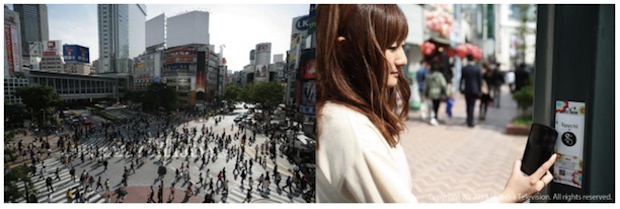Cyber Agent, the people of Ameba, are part of a three-company consortium behind the new Shibuya Clickable Project, a system for Online to Offline (O2O) services using IC tags and NFC-enabled smartphones.
Lampposts in Shibuya will have IC tags installed as stickers on them so that users with smartphones can receive data on events and nearby stores. The service will start in early June, provided by some 300 streetlights along Shibuya’s Koen-dori, Dougenzaka and Miyamasuzaka in collaboration with the retailers’ associations in the Shibuya station area.

Similar to the Ginza Ubiquitous Technology Project, which saw Ginza and other areas tagged with QR codes, IC tags and more to offer local information to pedestrians with a special handset, the idea here is to be more commercially viable, offering special deals to users who “scan” the lamppost tags — real-time coupons and so on. (The Ginza Ubiquitous Technology Project is a long-running scheme run rather haphazardly by the Tokyo Metropolitan Government ostensibly for tourists in Ginza, Ueno, Hamarikyu Gardens and so on.)
It sounds a bit analog to be tagging lampposts in Ginza or Shibuya in this way, but as Cyber Agent says, “by utilizing IC tag-embedded stickers, the user’s location can be determined more accurately than with GPS, the usual technology for establishing location, allowing the provision of more specific and detailed local information.”
The Shibuya Clickable Project will release information not only on retail sites but also can dispense invaluable maps and updates during disasters and hazards. However, its main purpose is for PR and promo information, such as coupons, product samples and campaign news for cafes, stores and events. Later it will be broadened to work with Mapion, a popular location search service, for better specified location data, and also install tags inside stores.
Visitors to Shibuya should also look out for “interactive measures linked to large outdoor video screens in Shibuya” and “campaigns utilizing treasure hunt games”.






















1 Comment
A very interesting initiative, that could prove helpful for shopping and in case of natural disaster. It’s a good way to show how mobile and instore marketing can improve our everyday-life and become a useful and centric part of the urban network in case of exceptional situations. A good idea to make marketing fall within the scope of a virtuous cycle.
Claude Nahon